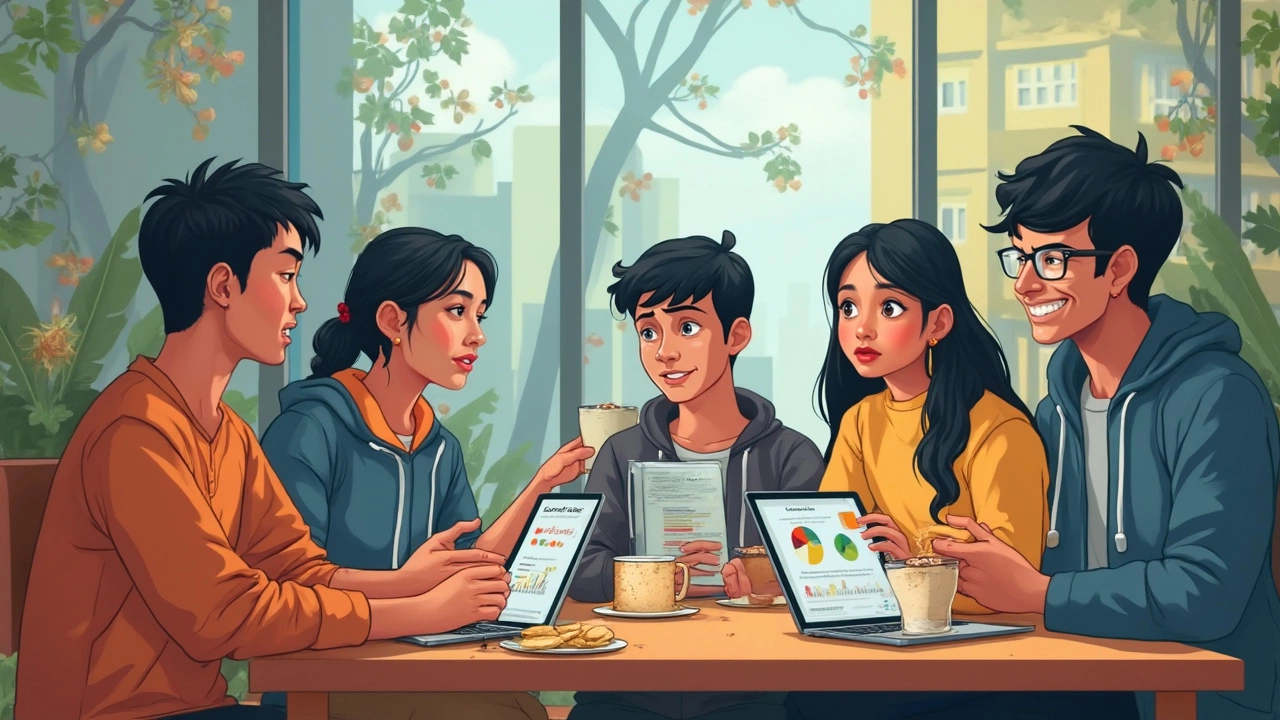So you want to start coding but everywhere you look feels like a maze of geeky terms, club memberships, and code so mysterious it could be ancient runes. Here’s the wild truth: nobody starts off as a code wizard. Every programmer you know probably started with “hello world” or, honestly, something they broke and had to fix. Picking the first programming language is not about being lucky—it’s about what sticks for you, what helps you see progress, and what actually gets used in real world projects.
Why Your First Programming Language Matters
You’d think picking your starter language is like picking a starter Pokémon—fun, right? But there’s more to it than just eenie-meenie-miney-mo. Your first language sets the stage for how quickly you learn, how much fun you’ll have, and whether you keep going or give up. Nobody wants to watch hours of tutorials or get lost on StackOverflow only to end up hating coding. Imagine learning to drive in a Formula One car versus a go-kart. One will make you scream for help, the other will make you want to take another lap.
Here’s the straight deal: some languages are built for humans, not robots or super geniuses. Choosing a beginner-friendly language means less time fighting confusing rules and more time actually creating stuff, which is what learning to code should be about. You get feedback faster—change something, see what happens. That kind of loop keeps the energy up, and energy is what gets you past those “why won’t this work” moments.
Certain languages also have massive communities that love helping out newbies. More help means fewer roadblocks. It’s not only about the language, but the people around it. Try asking people about Assembly or C++ and watch their faces; now ask about Python and get ready for a flood of memes, jokes, and real support. This combo of easy syntax, huge communities, and fast feedback makes some coding languages much better for people just getting their feet wet.
If you pick a language with tons of resources—think up-to-date courses, actual documentation, free websites, and loads of YouTube tutorials—you’re setting yourself up for wins instead of headaches. Plus, you want to make stuff that excites you, whether it’s games, websites, tiny robots, or something weird you dreamed up. Pick a language that powers the stuff you love. Benefits like job opportunities or tech trends are just bonuses if you’re actually having a good time learning.
The Top Languages for Beginners (and Why They Rock)
Let’s get into the real meat and potatoes: which languages actually make sense for someone brand new? Year after year, three or four names keep popping up everywhere programmers hang out. Don’t worry, I’m not going to throw a giant list and tell you “it depends.” Let’s dig into the best beginner coding languages and what makes them great.
- Python: This is the sweetheart of beginner coding, and for good reason. The syntax reads almost like regular English, which means you spend less time fighting the code and more time making things work. In 2023, Python was ranked as the world’s most popular programming language according to the TIOBE index. Its uses are crazy wide: web apps, games, machine learning, hacking together little scripts, you name it. And the community is gigantic. If you get stuck, someone on StackOverflow has seen your problem before.
- JavaScript: If you’ve ever wanted to mess around with web apps or make your own interactive website, JavaScript is your go-to language. You can run it right in your browser, so you don’t need to install heavy software. It powers most websites you visit, from Facebook to Netflix. Plus, with things like Node.js, you can use it for server stuff, too.
- Scratch: Maybe this seems kid-like, but Scratch is a solid option for absolute beginners, especially if you’re younger or just want to play with logic and thinking before learning a bunch of text commands. You move blocks around instead of typing code. Schools around the world teach with Scratch exactly for that reason—it lets you work out the logic without being scared off by scary errors.
- Ruby: Maybe not as trendy as a few years ago, but Ruby (especially with Rails) is another beginner-friendly choice. Lots of readable code and a super active community. Building small web apps, running automated scripts, or just learning logic? Ruby doesn’t hurt first-timers.
- Java: More complex than Python or JavaScript, but there’s a reason universities teach Java so much. If you’re aiming for Android apps or want to learn deep concepts (think object-oriented programming), this is a solid path. That said, the syntax can get a bit stuffy, so it may not feel as rewarding when you’re barely starting.
If you’re a stats lover, check this comparison table out (courtesy of data scraped from Github Trending 2024 and TIOBE 2025 Index):
| Language | Ease of Learning | Popular For | Active Community Score* | Beginner Course Count on Udemy |
|---|---|---|---|---|
| Python | Very easy | Data, Web, AI, Automation | 10/10 | 800+ |
| JavaScript | Easy | Web Apps, Games | 9.5/10 | 600+ |
| Scratch | Easiest | Logic, Animation, Games | 9/10 | 200+ |
| Ruby | Easy | Web Apps, Prototyping | 8/10 | 220+ |
| Java | Medium | Apps, Enterprise, Android | 8.5/10 | 650+ |
*Community score based on StackOverflow posts, Reddit activity, Discord and Slack channels, and Github repos active in the last 12 months.
Notice how Python stands out, not just in ease, but how many resources are out there for newbies. That’s why so many bootcamps and coding schools start here.

How to Pick the Right Language for You
Alright, you’ve seen the leaderboard. But how do you actually know which to start with? Don’t base it on what’s “hot” this year, or what some random dude on Reddit shouts about. Here’s how to actually make a smart call:
- What do you want to build? Start here. If you want to make websites or little browser games, JavaScript makes sense. If you want to automate boring tasks, Python is perfect. Android apps? Hello, Java. Play around with Scratch if you want to get a feel for how logic works without typing code at all.
- Check out a 30-minute tutorial on YouTube for each one. If the syntax or style of a language makes you groan, pick a different one. Coding is hard, so you have to like the look and flow of what you’re learning.
- Peek at free resources—Codecademy, freeCodeCamp, Khan Academy, and even your local library might surprise you. The more courses and guides out there, the less stuck you’ll get.
- Look up real-world projects, no matter how small, for each language. It’s way easier to feel motivated learning with the idea of building something cool soon—try a “todo” app, a silly chatbot, or a simple calculator.
- Consider future proofing, but don’t obsess. Tech will keep changing, but learning programming logic transfers between languages. What you learn in Python will help you if you switch later.
Here’s a quick hack: Start learning Python or JavaScript, build a tiny project in two weeks, then jump between the other languages if you’re curious. Coding is a tool, you’re not marrying it. Tinker until one feels right.
Tips to Make Learning Code Less Painful
If the idea of coding already has you sweating, relax. Here’s how regular humans make learning to code less brutal and more fun:
- Don’t code alone. Join a Discord server or find a study buddy. They’ll help you unstick and keep you accountable.
- Set “ugly” goals. Build something simple, even if it looks terrible. That messy first calculator or random joke generator is a win.
- Use “learn by doing” sites. Places like freeCodeCamp, Grasshopper, or SoloLearn force you to make mistakes and fix them, which by the way—is exactly how real programmers get good.
- Break your project into tiny steps. If you ever feel lost, ask: “What’s the very next thing?” Often it’s something silly: Get one button to work. Print some text. Things add up quickly.
- Don’t worry about “getting it all.” Every coder forgets stuff. Just get comfortable searching for answers instead of panicking.
- Build things that make you smile, not just the “top 10 coding projects every beginner should do.” Want to make a pun generator for your friends? Go for it. That’s how you stay excited.
Oh, and as you go, keep a “bug diary.” Jot down stuff that broke and how you fixed it. Future-you will thank you. It’s like an inside joke with yourself but actually useful.
Another angle: don’t spend forever picking a perfect language only to burn out reading syntax guides. Get your hands dirty in the code. The early months aren’t about depth, they’re about learning to think in a new way and getting small wins. Later, you can always switch languages or specialize deeper.

What About Long-Term and Job Prospects?
Plenty of people worry about “the future demand” for a language, or which coding skill lands better jobs. Honest advice? If you’re a complete beginner, this shouldn’t be your top concern. Recruiters care less about which beginner language you know, and more about whether you can solve problems and learn new things fast.
Saying that, there are trends worth knowing:
- Python keeps exploding in popularity because of artificial intelligence, automation, and data science. Two years ago, LinkedIn listed Python as the second most in-demand language, only behind SQL.
- JavaScript is the backbone of the modern web, used by 97% of all websites. You’ll find front-end and back-end roles, contract gigs, and side hustles everywhere using it.
- Java, while a little tougher, dominates the enterprise world, banks, Android apps, and many government systems.
- Ruby’s peak may have passed, but tons of companies still rely on Ruby on Rails for small teams moving fast.
- Coding logic doesn’t go out of style. If you can write solid Python or JavaScript today, you’ll have an easier time picking up TypeScript, Go, or anything else that pops up tomorrow. Knowing one language well is always better than spreading yourself too thin.
In a 2024 StackOverflow developer survey, Python topped the list as most “wanted” and “loved” language—especially among people breaking into tech for the first time. Why? Quick feedback, powerful libraries, easy syntax—and a career boost as a sweet bonus. The market may change in five years, but strong fundamentals always win.
Remember too: the first language is not your life partner, it’s just the first dance. Mastering one makes picking up others way, way easier.
